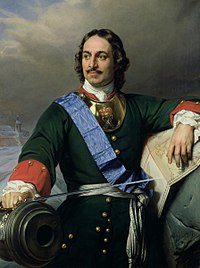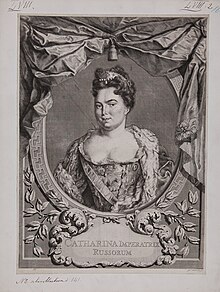Il falegname di Livonia
| Il falegname di Livonia | |
|---|---|
| Opera buffa by Gaetano Donizetti | |
 Donizetti as a young man | |
| Librettist | Gherardo Bevilacqua-Aldobrandini |
| Language | Italian |
| Based on | Alexandre Duval's Le menuisier de Livonie |
| Premiere | 26 December 1819 Teatro San Samuele in Venice |
Il falegname di Livonia, o Pietro il grande, czar delle Russie (The Livonian Carpenter, or Peter the Great, Tsar of the Russias) is an 1819 opera buffa in two acts with music by Gaetano Donizetti set to a libretto by Gherardo Bevilacqua-Aldobrandini. The libretto was based in part on Felice Romani's libretto for Giovanni Pacini's opera Il falegname di Livonia, which had just been presented at La Scala in Milan on 12 April 1819. Another source was Alexandre Duval's comedy Le menuisier de Livonie, ou Les illustres voyageurs (1805).[1]
Donizetti's Il falegname di Livonia was premiered on 26 December 1819 at the opening of the 1819/1820 Carnival season at the Teatro San Samuele in Venice. It was the fourth of Donizetti's operas to be performed during his lifetime and the first to achieve "more than one production".[2] It had about seven stagings until 1827, when its last known performance in the 19th century took place.
Performance history
The opera was neglected until 2003 when it was given a performance in Saint Petersburg, thanks to the artistic director of the St Petersburg Chamber Opera, Yuri Alexandrov, who spent three years in search of the score for the opera, which, so it appeared, had been lost forever. The painstaking work yielded results: the score was restored fragment by fragment. The Russian premiere took place on 27 May 2003 at the Saint Petersburg]] Chamber Opera, with staging by Yuri Alexandrov and the Russian and Italian versions of the libretto by Yuri Dimitrin.[citation needed]
In 2004, the opera was presented by the Festival della Valle d'Itria in Martina Franca; those performances were recorded.[3]
Roles

| Role | Voice type | Premiere cast, 26 December 1819 |
|---|---|---|
| Pietro il Grande (Peter the Great) | bass | Pio Botticelli |
| Caterina (Catherine I of Russia, his wife) | soprano | Adelaide Raffi |
| Madama Fritz, innkeeper | mezzo-soprano | Caterina Amati |
| Annetta Mazepa, innkeeper | soprano | Angela Bertozzi |
| Carlo Scavronski, carpenter of Livonia | tenor | Giovanni Battista Verger |
| Ser Cuccupis, magistrate | bass | Luigi Martinelli |
| Firman Trombest, in the role of the usurer | bass | Giuseppe Guglielmini |
| Hondediski, muscovite captain | baritone | Gaetano Rambaldi |
| Mayors, couriers, followers of the Czar | ||
Synopsis

- Time: Late 17th century
- Place: The Baltic State of Livonia (now Latvia and Estonia)[4] in an unnamed town under Russian rule.
Act 1
Carlo, a carpenter, is in love with the orphan Annetta. He claims to be of noble origin and shows that he has a bit of a temper when the tsar and his wife, Catherine, arrive, both travelling incognito. They are looking for the tsarina's lost brother, and have reason to suspect that it might be Carlo. The tsar asks the hotelier, Madame Fritz, about this carpenter. When Carlo enters, he does not know who the strangers are and he is rather insolent. An argument ensues, with Peter threatening Carlo with dire consequences. The town magistrate, Ser Cuccupis, also gets into an argument with Peter. This magistrate has pretensions of grandeur and goes so far as to threaten him with his friend, the tsar. Peter decides to pull rank on the magistrate, and tells him that he is Menshikov, a high officer of the tsar. The magistrate has Carlo imprisoned, and he is about to be convicted when Madame Fritz runs in with some documents proving that he is Catherine's brother.
Act 2
When Carlo becomes aware that he is the tsar's brother-in-law, he introduces Annetta to the imperial couple. Again, not knowing the true identity of the couple, he warns them that the tsar must never see her because she is the daughter of the traitor hetman Ivan Mazepa. When told that Mazepa is dead, the false Menshikov pardons the girl. Then the captain of the troops tells the magistrate that Menshikov is actually the tsar. Hoping that this would be an opportunity to advance himself, the magistrate tries to intervene, but since the tsar has already recognized him for what he is, he is fired from his position of authority and is ordered to pay a fine. Peter, Catherine, Carlo and Annetta leave happily for St Petersburg.
Recordings
| Year | Cast: Pietro il Grande, Caterina, Madame Fritz, Annetta, Carlo |
Conductor, opera house and orchestra |
Label[3] |
|---|---|---|---|
| 2004 | Vito Priante Eufemia Tafuro, Rosa Anna Peraino, Rosa Sorice, Alessandro Codeluppi |
Marco Berdondini, Orchestra Internazionale d’Italia and the Coro da Camera di Bratislava (Recorded at performances in the Atrio di Palazzo Ducale, Martina Franca as part of the Festival della Valle d'Itria. There were performances on 27, 28 July)[5] |
CD: Dynamic Cat: CDS 473-1/2 |
Note: The act 2 sextet is included in A Hundred Years of Italian Opera, 1810–1820 (Opera Rara; Cat: ORCH103).
References
Notes
- ^ Osborne 1994, pp. 143–144; Ashbrook 1982, p. 534; Ashbrook 1992, p. 1215; Ashbrook, Black, and Budden 1998.
- ^ Osborne 1994, p. 144.
- ^ a b Recording on operadis-opera-discography.org.uk
- ^ Osborne 1994, p. 143.
- ^ Title on Dynamic CDS 473-1/2: Pietro il Grande Kzar delle Russie o sia il falegname di Livonia. OCLC 611387578, 488608063, 638077254.
Cited sources
- Osborne, Charles (1994). The Bel Canto Operas of Rossini, Donizetti, and Bellini. Portland, Oregon: Amadeus Press. ISBN 0-931340-71-3.
Further reading
- Allitt, John Stewart (1991), Donizetti: in the light of Romanticism and the teaching of Johann Simon Mayr, Shaftesbury: Element Books, Ltd (UK); Rockport, MA: Element, Inc.(USA)
- Ashbrook, William (1982), Donizetti and His Operas. Cambridge University Press., ISBN 0-521-23526-X.
- Ashbrook, William; John Black; Julian Budden (1998), "Donizetti, (Domenico) Gaetano (Maria)", in Stanley Sadie (Ed.), The New Grove Dictionary of Opera, vol. 1, pp. 1206–1221. London: MacMillan Publishers, Inc. ISBN 0-333-73432-7 ISBN 1-56159-228-5
- Ashbrook, William and Sarah Hibberd (2001), in Holden, Amanda (Ed.), The New Penguin Opera Guide, New York: Penguin Putnam. ISBN 0-14-029312-4. pp. 224–247.
- Loewenberg, Alfred (1970). Annals of Opera, 1597–1940, 2nd edition. Rowman and Littlefield
- Sadie, Stanley, (ed.); John Tyrrell (exec. ed.) (2001), The New Grove Dictionary of Music and Musicians. London: Macmillan. ISBN 978-1-56159-239-5 (hardcover). OCLC 419285866 (eBook).
- Weinstock, Herbert (1963), Donizetti and the World of Opera in Italy, Paris, and Vienna in the First Half of the Nineteenth Century, New York: Pantheon Books. LCCN 63-13703
External links
- Donizetti Society (London) website
- Libretto (Italian) 1
- Libretto (Italian) 2 Archived 2012-02-04 at the Wayback Machine
- Il Falegname di Livonia, ossia Pietro Il Grande, Russian premiere presented by the St Petersburg Chamber Opera Company.
- Kaufman, Tom, "Donizetti: Pietro il Grande, on operatoday.com, 13 Sep 2005. (Review of recording)
